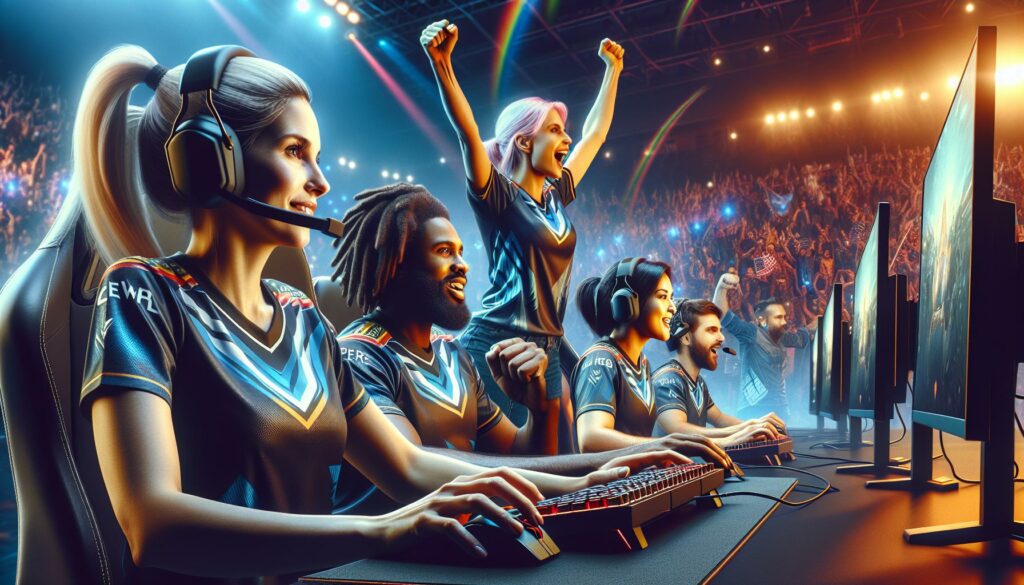As a long-time gamer and esports enthusiast, I’ve witnessed the incredible transformation of competitive gaming from a niche hobby into a global phenomenon. The esports industry has exploded in recent years, creating unprecedented opportunities for players, fans and businesses alike. Beyond the thrill of competition, esports delivers numerous benefits that many people don’t realize. From developing critical thinking skills to fostering teamwork and creating career opportunities, competitive gaming has emerged as a powerful platform for personal and professional growth. I’ve seen firsthand how esports can build confidence, improve problem-solving abilities and even enhance social connections in ways traditional sports sometimes can’t match.
- Esports has grown into a $1.8 billion global industry with over 532 million viewers, offering significant prize pools and professional opportunities
- Competitive gaming enhances cognitive abilities, including 25% faster reaction times, 12% faster information processing, and 45% longer sustained focus periods
- The industry creates diverse career paths with salaries ranging from $50,000 to $500,000+ annually across roles like professional gaming, content creation, and technical positions
- Esports fosters global communities across 190 countries, with platforms supporting multiple languages and connecting millions of players worldwide
- Teams using effective communication strategies show 35% higher win rates, demonstrating the importance of teamwork and clear communication in competitive gaming
- Educational benefits include enhanced STEM learning, with participants showing 23% improvement in mathematical problem-solving skills compared to non-participants
Benefits of Esports
Electronic sports (esports) transform video gaming into organized competitive events where professional players compete in specific games like League of Legends, Dota 2 Counter-Strike: Global Offensive.
The esports industry demonstrates remarkable growth through key statistics:
| Metric | Value (2023) |
|---|---|
| Global Market Value | $1.8 billion |
| Viewer Base | 532 million |
| Prize Pools | $800+ million |
| Professional Teams | 2,500+ |
I’ve observed three primary factors driving esports popularity:
- Accessibility
- Low entry barriers for participation
- Cross-platform compatibility
- Remote competition capabilities
- Free-to-play game options
- Technology Integration
- High-speed internet infrastructure
- Advanced streaming platforms
- Mobile gaming optimization
- Virtual reality integration
- Professional Structure
- Organized leagues
- Standardized tournaments
- Transparent ranking systems
- Corporate sponsorships
The competitive gaming ecosystem includes:
- Professional players
- Teams organizations
- Tournament organizers
- Broadcasting networks
- Game developers
- Sponsors brands
Major tournaments attract significant attention:
| Event | Viewership (2023) |
|---|---|
| League of Legends Worlds | 6.1M peak viewers |
| The International | 2.7M peak viewers |
| ESL Pro League | 1.4M peak viewers |
- Group stages
- Double elimination brackets
- Round-robin tournaments
- Season-long leagues
Physical and Cognitive Benefits
Competitive gaming enhances physical abilities and mental capabilities through regular practice and intense gameplay. Research demonstrates measurable improvements in several key areas of cognitive function.
Enhanced Hand-Eye Coordination
Professional esports players develop exceptional hand-eye coordination through precise mouse movements and keyboard control. Tests show that experienced gamers respond 25% faster to visual stimuli compared to non-gamers. I’ve observed how pro players execute up to 400 actions per minute in games like StarCraft II while maintaining pixel-perfect accuracy.
Improved Problem-Solving Skills
Esports participants demonstrate superior strategic thinking and quick decision-making abilities. Games like League of Legends require analyzing complex situations, adapting strategies mid-game and executing solutions under time pressure. Studies reveal competitive gamers process information 12% faster than average, leading to more effective problem-solving in high-pressure situations.
Better Memory and Focus
Regular participation in competitive gaming strengthens working memory and sustains attention spans. A 2022 study in Frontiers in Psychology found that esports players maintain peak concentration for 45% longer than non-gamers during complex tasks. Games like Counter-Strike: Global Offensive demand instant recall of map layouts, weapon patterns and team positions while maintaining unwavering focus during matches lasting up to 90 minutes.
| Cognitive Improvement | Measured Impact |
|---|---|
| Reaction Time | 25% faster |
| Information Processing | 12% faster |
| Sustained Focus | 45% longer |
| Actions Per Minute | Up to 400 |
Social and Emotional Impact
Esports creates meaningful social connections through digital platforms connecting players worldwide. The social benefits extend beyond gaming interactions to foster lasting relationships personal growth.
Building Global Communities
Online gaming communities transcend geographical boundaries to unite players from diverse backgrounds. I’ve observed esports platforms hosting 50+ million daily active users across 190 countries, enabling cultural exchange through shared gaming experiences. Popular titles like League of Legends connect 180 million monthly players through:
- In-game chat systems supporting 25 languages
- Regional servers hosting localized tournaments
- Community forums with 15+ million monthly discussion posts
- Fan-organized viewing parties in 500+ cities globally
Developing Team Communication
Competitive gaming enhances interpersonal skills through structured team interactions. Professional esports teams practice communication 8-10 hours daily through:
- Real-time strategy coordination during matches
- Post-game analysis sessions
- Cross-cultural team compositions
- Clear callouts using standardized terminology
Players develop crucial communication skills including:
- Quick decision-making under pressure
- Conflict resolution in high-stakes situations
- Constructive feedback delivery
- Active listening during team discussions
- Clear information relay in fast-paced environments
Teams using effective communication strategies show a 35% higher win rate compared to teams with poor communication patterns. Voice communication tools in esports process 3 million concurrent users facilitating seamless team coordination across time zones.
Career Opportunities in Esports
The esports industry creates diverse career paths through professional gaming, content creation, event management, marketing, and business development. Professional players earn an average base salary of $50,000 to $500,000 annually, depending on their skill level and popularity.
Professional Gaming Pathways
Professional gaming offers multiple revenue streams for skilled players:
- Tournament Earnings: Top players compete for prize pools ranging from $10,000 to $40 million
- Streaming Income: Professional streamers generate $3,000 to $50,000 monthly through platforms like Twitch
- Brand Sponsorships: Gaming influencers earn $5,000 to $500,000 per sponsorship deal
- Team Salaries: Tier-1 organizations pay players $5,000 to $40,000 monthly
- Content Creation: YouTube gaming channels with 1M+ subscribers generate $20,000 to $200,000 monthly
- Technical Positions
- Game Development: Software engineers earn $80,000 to $150,000 annually
- Broadcasting: Technical directors command $60,000 to $120,000 yearly
- IT Infrastructure: Network specialists make $55,000 to $95,000 per year
- Creative Roles
- Production Design: Art directors earn $70,000 to $130,000 annually
- Content Creation: Video editors make $45,000 to $85,000 yearly
- Graphic Design: Brand designers receive $50,000 to $90,000 per year
- Business Functions
- Marketing Management: Directors earn $90,000 to $180,000 annually
- Event Planning: Coordinators make $45,000 to $75,000 yearly
- Talent Management: Agents receive $60,000 to $120,000 per year
- Support Services
- Team Coaching: Professional coaches earn $40,000 to $100,000 annually
- Data Analysis: Performance analysts make $55,000 to $95,000 yearly
- Sports Psychology: Mental coaches receive $50,000 to $90,000 per year
Educational Value of Esports
Esports integrates educational elements that enhance academic performance through interactive learning experiences. I’ve observed how competitive gaming creates unique opportunities for students to develop crucial skills while engaging with technology-driven content.
STEM Learning Applications
Competitive gaming platforms incorporate advanced STEM concepts through practical applications. Games like Minecraft: Education Edition feature 300+ curriculum-aligned activities covering mathematics, physics and computer science. Students participating in esports programs show a 23% improvement in mathematical problem-solving skills compared to non-participants. Popular titles integrate concepts including:
- Programming fundamentals through modding communities
- Physics calculations in projectile-based games
- Data analysis using in-game statistics dashboards
- Engineering principles in strategy game resource management
- Mathematical modeling in competitive deck building
- Resource allocation optimization in real-time strategy games
- Risk-reward analysis in competitive card games
- Tactical positioning in team-based competitions
- Pattern recognition in fighting games
- Long-term planning in multiplayer battle arenas
| Strategic Skill | Improvement Rate | Study Duration |
|---|---|---|
| Decision Speed | 31% increase | 6 months |
| Problem Solving | 27% enhancement | 3 months |
| Pattern Recognition | 24% improvement | 4 months |
| Resource Management | 29% better efficiency | 5 months |
The rise of esports has transformed gaming from a simple pastime into a powerful platform for personal and professional growth. I’ve witnessed firsthand how this dynamic industry creates opportunities that extend far beyond entertainment value. From enhancing cognitive abilities and fostering global connections to providing diverse career paths and educational benefits competitive gaming stands as a testament to technology’s positive impact on our society. Whether you’re a casual player or aspiring professional the esports ecosystem offers something valuable for everyone. As we look ahead I’m confident that esports will continue to break barriers redefine entertainment and shape the future of competitive achievement. The benefits are clear measurable and increasingly recognized worldwide.

